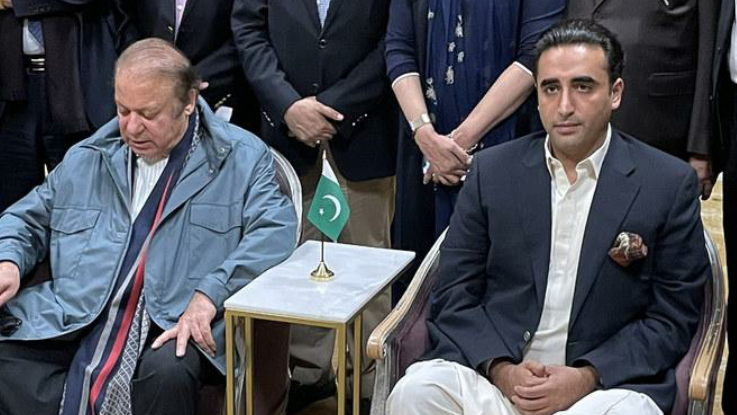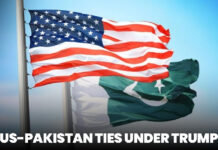Left: Nawaz Sharif Leader of Pakistan Muslim League- Nawaz (PML-N) Right: Bilawal Bhutto Zardari Leader of Pakistan People’s Party (PPP)
Currently, Pakistan is confronted with a significant political quandary. The military appears to be implementing a provisional resolution by allying the Pakistan Muslim League Nawaz and the Pakistan Peoples Party. Nevertheless, the longevity of such an arrangement remains highly unpredictable. If these two political entities fail to maintain unity, the likely outcome would be Imran’s ascent to power. This scenario is undoubtedly unacceptable to both the parties and the Army. Consequently, the pressing issue that arises is whether the nation will once again experience military rule.
Successful Military Coups
1953-1954 coup. Governor-General Ghulam Khan led the coup against the civilian administration led by Prime Minister Khawaja Nazimuddin due to substantial political unrest and economic instability, Ghulam Khan disbanded the Constituent Assembly in 1954 to prevent it from the amendments which limited the Governor-General’s authority. This incident was preceded by the Federation of Pakistan v. Maulvi Tamizuddin Khan case, in which the courts failed to defend representative institutions, justifying military action against elected governments as a “Doctrine of necessity”. Ghulam Khan with the assistants of the military carried out the coup, which was motivated by political instability, an economic crisis, and the perception of the civilian government’s inefficiency, ushering in military rule in Pakistan.
1958 coup. Amidst political turmoil and civil disobedience from Pakistan’s conservative party, PML, President Iskandar Mirza dissolved the Constitution and declared that he was taking over the regime through military intervention in a letter to Prime Minister Feroz K Noon. This move was unexpected and kept mostly secret, with only US Ambassador James Langley informed. Mirza imposed military rule and appointed Ayub Khan as Chief of the Marshal Law Administration, but after thirteen days, Iskandar Mirza himself was exiled by Ayub Khan who Declared himself the president of Pakistan, Ayub justified his actions by stating that he intended to establish a democratic atmosphere where people could understand and cooperate with the government. Public reactions were mixed, with the common citizen supporting the anti-corruption stance, while the middle and upper-middle classes were more concerned about democracy being retained.
In 1960, Ayub Khan’s government introduced a referendum that led to the formation of an electoral college, asking the population if they trusted him. With a high 95.6% voter turnout, the new presidential system was approved. Ayub Khan then became president for the next five years.
1977 coup. At midnight of 4th July, 1977, Pakistan experienced another military coup, this time led by General Zia-ul-Haq, he named it “Operation fare Play” aiming to prevent Prime Minister Zulfikar Ali Bhutto from consolidating power and maintaining the influential position of the military in domestic politics of Pakistan. This event was the turning point in the history of the politics of Pakistan, initiating the process of Islamization under the military regime of General Zia. At that time, the Bhutto-led civilian government faced political unrest and corruption allegations. K. M Arif, a General, warned Bhutto about an impending coup at the GHQ in Rawalpindi. Despite this, Bhutto continued discussions with Pakistan National Alliance (PNA) leaders, resulting in a deal to dissolve the legislature and hold new elections.
However, on July 5, 1977, Bhutto and his cabinet were arrested by the forces on the orders of General Zia. The coup was disguised as a response to disturbances, even as Bhutto attempted to negotiate with the opposition. Upon seizing power, Zia declared military rule, suspended the constitution, disbanded all legislatures, and promised fresh elections within 90 days. He arrested numerous high-ranking members of both the Pakistan Peoples Party (PPP) and the PNA. Although Bhutto was temporarily released and greeted warmly by his supporters, he was re-arrested on September 16th. This led to Nusrat, Bhutto’s wife, becoming the PPP president and other PPP officials being detained. The side effects of the coup significantly transformed the political ecosystem in Pakistan, with General Zia’s government signalling hardening of Islamization. Some Pakistanis who were discontented with Bhutto’s previous administration, welcomed General Zia’s rule.
1999 coup. Concerns regarding a possible coup within President Pervez Musharraf’s government led to significant discussions between military leaders and regional corps commanders. To alleviate fears of a rift between Musharraf and Prime Minister Nawaz Sharif, Musharraf agreed to serve for two more years. However, tensions escalated when Musharraf’s plane was denied landing at Karachi International Airport. In response, local military authorities mobilized troops, and Sharif replaced Musharraf with K. Ziauddin. Sharif attempted to divert Musharraf’s flight to India, but this plan was thwarted by troops surrounding the airport’s control tower.
On October 15th, Musharraf announced a “State of Emergency ” in Pakistan, and took over as Chief of Administration. He removed political opponents and appointed a civil-military council to run the state. Although Musharraf gained administrative power, he did not become Prime Minister. The coup faced international criticism, causing Pakistan to face a standstill within the Commonwealth of Nations. Nawaz Sharif was placed under home custody and later managed to leave for Saudi Arabia. He was accused of various crimes, including abduction, attempted murder, hijacking, and treason, for his role in stopping Musharraf’s plane at Karachi Airport. Sharif’s trial began in an anti-terrorism court in early 2000. Under pressure from the United States, Sharif was ultimately exiled to Saudi Arabia in December 2000.
Unsuccessful Military Coups
1951 coup. The 1951 Rawalpindi Conspiracy is a story of an attempted coup against Prime Minister Liaquat Ali Khan. Led by Maj Gen Akbar Khan, poet Faiz Ahmad Faiz, and Sajjad Zaheer, along with 12 others, the conspiracy was driven by dissatisfaction with corruption in the government, the British presence in the Pakistan Army, and the Kashmir problem. The plot included 11 military officers and 4 civilians, with Maj Gen Akbar Khan as the mastermind, Faiz Ahmed who was the editor of Pakistan Times was closely associated with the left-wing political figure linked to Pakistan’s Communist Party.
The coup attempt was foiled when one of Akbar Khan’s confidants informed the authorities. Consequently, the conspirators, including Akbar Khan and Faiz Ahmed, were arrested. A trial was held for 15 defendants, leading to the conviction and imprisonment of Faiz and Akbar Khan. H.S. Suhrawardy, a prominent Bengali politician, represented the defendants. In 1957, when Suhrawardy became Prime Minister, he pardoned most of the conspirators. Tragically, Liaquat Ali Khan was assassinated in Rawalpindi in October 1951.
In 1958, Gen Ayub Khan, who remained loyal to the government, led a successful military coup against Iskander Mirza, serving as president until 1969. Maj Gen Akbar Khan was later rehabilitated in Pakistani politics, working as an adviser to Zulfikar Ali Bhutto. Bhutto, upon seizing power in 1971, appointed Akbar Khan as the chairman of the National Security Council. Naseem Shahnawaz, Akbar Khan’s wife, changed her name to Naseem Jahan and pursued a political career. Faiz continued his poetic endeavours and was appointed to the National Council of Arts by Bhutto.
1980 coup. another significant event in Pakistan’s political and military history occurred when a plot to assassinate the military dictator Zia-ul-Haq was discovered and thwarted. Maj. Gen. Tajammul Hussain Malik, a high-ranking army commander, orchestrated the attempt during the Pakistan Day parade on March 23rd. His involvement in the Hamoodur Rehman Commission probe led to a military investigation by Army Chief Gen. Zia-ul-Haq.
The inquiry revealed that Malik aimed to overthrow Zulfiqar Ali Bhutto’s administration and replace it with one led by General Tajammul. In 1977, Malik had previously attempted a coup against Pakistan’s government and military authorities, which failed. In 1980, he planned another coup, this time targeting the military regime of Zia. He collaborated with his son, Naveed Tajammul, and other top army commanders to assassinate Zia-ul-Haq. However, the conspiracy was exposed, and Malik, his son, and the other conspirators were arrested, convicted, and sentenced to life imprisonment. Despite being offered the chance to seek exile, they chose to stay in Pakistan, facing the consequences of their actions.
1995 Coup. Another coup was attempted, this time led by Major General Abdul Ahad Abbasi, This event led to PM Benazir Bhutto’s resignation and initiated an era of political instability. Abbasi, a senior military commander, was accused of organising a coup against Bhutto and the army chief, Gen. Abdul W. Kakar, aiming to destabilise the government, eliminate key political and military figures, and impose Islamic law in Pakistan. The coup attempt was foiled by Lt. Gen. Ali K. Khan, the DGMI, who discovered the plot. Consequently, the conspirators, including Abbasi, were tried in court and received jail terms ranging from 7 to 14 years.
Abbasi claimed he was not the main force behind the coup, and upon release, he floated Azmat-e-Islam Bedar Pakistan, a political organisation promoting Islamic law through constitutional means. The 1995 coup attempt exposed tensions between a democratically elected civilian government and an autocratic military establishment leading to political instability. It highlighted the need for better checks and balances within military and civilian institutions to prevent future attempts to undermine democracy. The incident also emphasised the importance of separating the military and political realms in Pakistan. The consequences of this event continue to impact the political situation in Pakistan, stressing the importance of fostering a strong democratic culture and ensuring all institutions’ responsibility in governance.
The Voice of the Dissenters
It is observed that the majority of civilians predominantly exhibit a preference for democratic governments over military control. They prefer a “free and fairly conducted elections,” the maintenance of “Law and Order” and the protection of “Fundamental Rights” that democratic systems ensure. This inclination is driven by the pursuit of a stable, affluent society with equal opportunities for all individuals, particularly those belonging to the middle class. However, Pakistan’s history has been marked by several military coups, which have often led to political instability, suppression of civil liberties, and a weakened democratic framework. Military regimes have been criticised for their authoritarian nature and interference in civilian affairs. Since its establishment, Pakistan has witnessed three significant military coups in 1958, 1977, and 1999, each resulting in political instability, economic crises, and human rights violations. It is essential to acknowledge that the beliefs of the middle class may vary based on their personal experiences, political affiliations, and the period in which they were raised. Some may prioritise the stability and order that military control may provide, while others emphasise democratic principles and freedom.
– Punit Shyam Gore






















